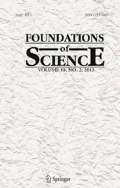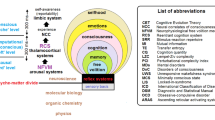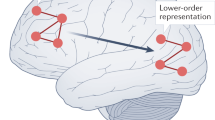Abstract
It is shown that the evolution of physics canin several regards be described by elements of``regression'', i.e., that within a certaintradition of ideas one begins with theconstruction of most ``plausible'' statements(axioms) at hand, and then ``works onselfbackwards'' with respect to developmental terms.As a consequence of this strategy, the furtherwork proceeds along such a ``regressive'' path,the more one arrives at concepts andrelationships which are unexpected or evencounter-intuitive in terms of our everydayexperiences. However, a comparable phenomenology is wellknown from studies on states of consciousness.In particular, the evolutionary logic of theconstructions of major ``cognitive invariances''in physics, which is in part due to everincreasing rates of data processing, ismirrored in a logic of states of consciousnesswhich deviate from a ``normal'' state of dailyroutine along increasing levels of centralnervous arousal. Examples are given from the evolution ofphysics, and future perspectives are brieflyoutlined on the basis thereof.
Similar content being viewed by others
REFERENCES
Deutsch, D., A. Ekert and R. Lupacchini: 1999, Machines, Logic and Quantum Physics. E-print: math.HO/9911150 (19 Nov. 1999).
Eliade, M.: 1980, Schmiede und Alchemisten. Stuttgart.
Feyerabend, P.: 1977, Against Method. London.
Fischer, R.: 1971, A Cartography of the Ecstatic and Meditative States. Science 174 (26 Nov. 1971): 897–904.
Fischer, R.: 1975/76, Transformations of Consciousness. Parts I and II. Confin. Psychiat. 18 (1975): 221–244, and 19 (1976): 1-23.
Fischer, R.: 1990,Why the Mind Is Not in the Head but in Society's Connectionist Network. Diogenes 151: 1–27.
Fischer, R.: 1995, There Is No Cause-effect Relationship between the Neural and the Mental. Cybernetica 38(2): 141–151.
Foerster, H. v.: 1985, Sicht und Einsicht. Braunschweig.
Freeman, W.: 1990, On the Problem of Anomalous Dispersion in Chaoto-Chaotic Phase Transitions of Neural Masses, and Its Significance for the Management of Perceptual Information in Brains. In H. Haken and M. Stadler (eds.), Synergetics of Cognition. Heidelberg, 126–143.
Gibson, W.: 1988, Neuromancer. London.
Glasersfeld, E. v.: 1998, Die Radikal-Konstruktivistische Wissenstheorie. Ethik und Sozialwissenschaften 9: 4, a special edition on E. v. Glasersfeld.
Grössing, G.: 1993, Das Unbewusste in der Physik. Vienna.
Grössing, G.: 1997, Die Information des Subjekts. Vienna.
Grössing, G.: 2000, Quantum Cybernetics. New York.
Günther, G.: 1980, Beiträge zur Grundlegung einer operationsfähigen Dialektik. Hamburg.
Holton, G.: 1988, Thematic Origins of Scientific Thought. Cambridge.
Houellebecq, M.: 1998, Les particules élémentaires. Paris.
Ivanov, V.V.: 1983, Gerade und Ungerade: Die Asymmetrie des Gehirns und der Zeichensysteme. Stuttgart.
Koch, W.A.: 1983, Poetry and Science: Semiogenetical Twins. Tübingen.
Kurzweil, R.: 1999, The Age of Spiritual Machines. New York.
Piaget, J.: 1937, La construction du réel chez l'enfant. Neuchatel.
Piaget, J.: 1970, Genetic Epistemology. New York.
Prigogine, I.: 1980, FromBeing to Becoming. San Francisco.
Prigogine, I. and I.U Stengers: 1981, Dialog mit der Natur. Munich.
Sloterdijk, P.: 1999, Regeln für den Menschenpark. Die Zeit 38 (16. 9. 1999): 15–21.
Varela, F.: 1979, Principles of Biological Autonomy. New York, Oxford.
Author information
Authors and Affiliations
Rights and permissions
About this article
Cite this article
Grössing, G. Comparing the Long-Term Evolution of ``Cognitive Invariances'' in Physics with a Dynamics in States of Consciousness. Foundations of Science 6, 255–272 (2001). https://doi.org/10.1023/A:1011654702976
Issue Date:
DOI: https://doi.org/10.1023/A:1011654702976




